|
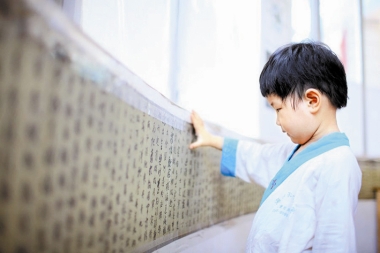
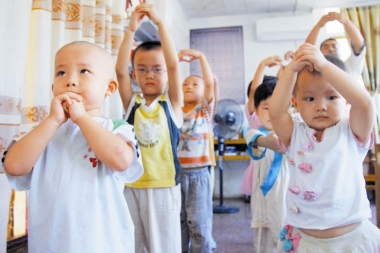
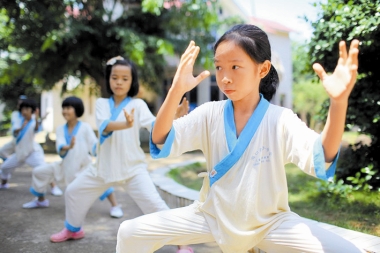
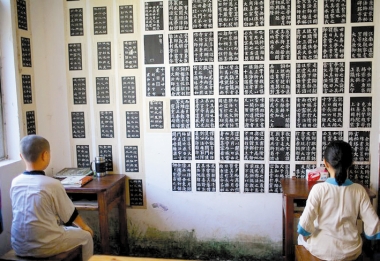
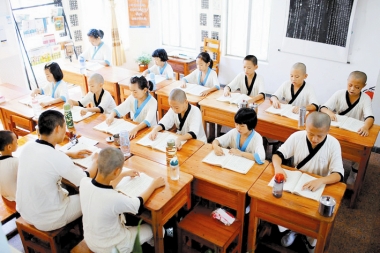
AS hundreds of millions of Chinese pupils headed back to school for the new semester last week, a handful of children in an old-fashioned private school in China’s southern island province of Hainan experienced an alternative to modern traditional schooling.
There are no quizzes and no homework. Instead, these children focus on reciting and memorizing Chinese literary masterpieces from figures such as Confucius and Mencius.
Fu Yaqing, 7, is one of seven children attending the private Confucius School to receive an old-fashioned education, radically different from her peers.
Getting up at 5:30 a.m. every day, Fu and her classmates begin their day by paying tribute to Confucius, standing in line and bowing three times in front of a picture of the acclaimed philosopher who lived about 2,500 years ago.
The kids are also asked to thank their parents, teachers and classmates before every meal.
Their daily tasks include reciting and memorizing classic literary works, including “The Four Books of Confucianism;” “The Analects of Confucius;” “The Book of Mencius;” “The Great Learning;” and “The Doctrine of the Mean.”
Although most of the students barely know a word of English, they are also asked to recite, but not to learn, some Shakespearean works, such as “A Midsummer Night’s Dream.”
No other subjects, including mathematics and science, are taught in this school except for calligraphy and physical education.
Fu’s mother Zhou Xiaoyun, an avid fan of the Chinese classics, said it is a waste of time for her child to spend six years in an ordinary school studying subjects that are too simple.
“Kids of this age have the best memories, and memorization of Chinese classical literary works will influence their future lives, even though they don’t understand the works’ exact meaning,” Zhou said.
Rational retrogression?
Tian Guiliang, the founder of the private boarding school, said he originally hoped to educate his two children in the traditional way.
In March 2010, he established the Confucius School to cater to the needs of like-minded parents.
There are six teachers looking after three classes in the school — one for students under the age of 7, another for students between 7 and 13, and the third class is for the especially gifted.
Tian said the old-fashioned educational style focusing on recitation has a scientific basis because children under the age of 13 have the best powers of memorization.
“Through reciting classic works of literature, their potential will be explored while the moral principles expressed in the books will be instilled in them,” Tian said.
“The children cannot fully understand the content of what they are reciting. But as they grow up, they will gradually comprehend,” he added.
Tian’s theory is endorsed and supported by Zhou, who thinks that the modern education system only feeds children the simplest knowledge in the most complicated and arduous ways.
Third-grader Chen Shihan terminated his study at a primary school in Guangdong Province three months ago and moved here.
“My previous school would give me impossible amounts of homework and sometimes I had to stay up until midnight, dozing the next day due to lack of sleep,” Chen said.
“My parents said I’ve made remarkable progress since moving here,” he said.
Risky retrogression?
Private schools of this kind are not common in cities. In the mountainous suburbs of Beijing, there are about 10 private schools that focus on providing a classical Chinese literary education.
These schools are generally expensive, targeting well-off middle- and upper-class families.
It costs 30,000 yuan (US$4,687) a year to enroll a student in the Confucius School in Hainan, which is about three times as much as an ordinary boarding school.
Experts argue, however, that replacing modern education with an imitation of the older style is a big risk.
Yang Junlong, a psychologist in Hainan, said children in modern society need to acquire comprehensive and applicable knowledge.
“These kids will face a knowledge gap if they are not taught subjects like English and mathematics, and they will have difficulty adapting themselves to an ordinary school to further their study,” Yang said.
Yang’s concern is dismissed by Tian and Zhou, both of whom believe that the students who receive an old-fashioned education will easily obtain other knowledge and soon catch up to or surpass their peers.
Zhong Dongmei, a professor of classical Chinese literature at Hainan University, said the popularity of old-style private schools should force educators to analyze the shortcomings of modern education and make improvements and adjustments.
But she also insists that substituting a modern primary school education with the recitation of ancient literary works is radical.
“An education in the works of classical literature is only part of an education. It should not be all,” Zhong said.
Lin Mingju, a policy and regulation director at the Education Department of Hainan, said the Confucius School is registered as a training institution.
“Full-time education in this style is beyond its authorized business scope and it is illegal,” Lin said.
“Parents of school-age children have the obligation to send their kids to school to receive nine years of compulsory education in line with Chinese law,” Lin added.(Xinhua)
|

